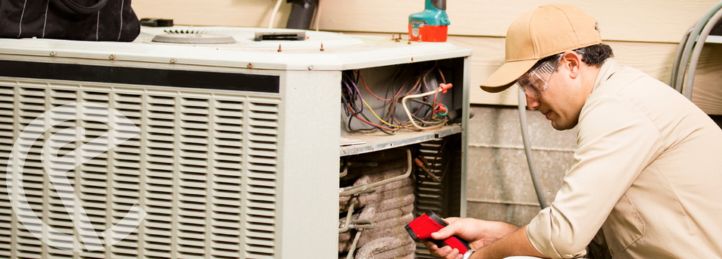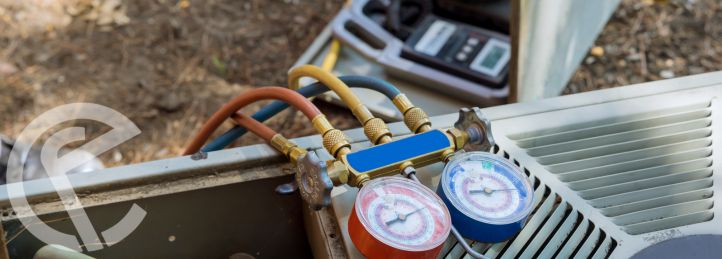Air Conditioning Services in San Antonio, TX

When the Texas heat hits hard, San Antonio homeowners turn to Evenflow Home & Commercial Services for trusted, high-efficiency air conditioning solutions. Our locally owned and operated team provides expert AC repair, installation, and maintenance services designed for dependable comfort and energy savings.
- We Are Locally Owned and Operated: As part of the San Antonio community, we treat every customer like a neighbor and every home like our own.
- 100% Satisfaction Guarantee: We stand behind our work on every job, no exceptions. Your comfort and confidence are our top priorities.
- Focused on Superior Customer Support: From your first call to final inspection, we deliver clear communication and a seamless service experience.
Our team brings extensive experience, Christian values, and top-rated service to every cooling project. Whether you’re dealing with inconsistent temperatures or planning a system upgrade, Evenflow Home & Commercial Services is ready to deliver professional results.
Where your service flows smoothly from start to finish: we guarantee it. Schedule an appointment with Evenflow Home & Commercial Services today!

Why Choose Evenflow Home & Commercial Services for Air Conditioning in San Antonio?
As a faith-based organization and award-winning service provider, we bring more than just tools and training. We bring care, accountability, and a commitment to excellence in everything we do.
We understand that each home has unique cooling needs, and our team is trained to diagnose, design, and deliver efficient AC solutions built for Texas summers.
Local Experts, Personal Service
We live and work in the same neighborhoods we serve. That gives us a unique understanding of regional weather patterns, energy demands, and home construction.
- Voted Top Service Company on Home Advisor: Our reputation for responsive, reliable service is built on real customer experiences.
- Rated "A" by the Better Business Bureau: We hold ourselves to the highest standards of integrity and customer care.
- Prompt Scheduling and Courteous Technicians: We arrive on time, explain every step, and leave your home as clean as we found it.
Full-Scope AC Services for Homes and Small Businesses
Our licensed technicians handle all types of air conditioning systems, from single-family homes to small commercial properties.
- AC Repair: Fast troubleshooting and lasting fixes for all brands and models, including refrigerant leaks, compressor issues, electrical faults, and airflow problems.
- System Installation & Replacement: Energy-efficient system design and replacement services using top-rated brands matched to your home’s cooling load.
- Seasonal Maintenance and Tune-Ups: Prevent unexpected breakdowns and extend equipment life with our precision tune-up services.
- Smart Thermostat Setup: Improve energy control and comfort with professional thermostat integration.
- Airflow Optimization and Duct Sealing: Ensure even temperatures and efficient cooling across your entire home.
Transparent Pricing and Guaranteed Satisfaction
With Evenflow Home & Commercial Services, you never have to wonder about costs or outcomes. We believe in honest pricing and long-term solutions.
- Upfront Quotes With No Surprise Charges: You approve all work before we begin.
- Options for Every Budget: We offer high-quality equipment, financing options, and honest guidance to match your goals.
- Follow-Up and Support: If something isn’t right, we’ll make it right.
Want fast, friendly, and dependable AC service? Call Evenflow Home & Commercial Services and discover why San Antonio families keep us on speed dial.
Stay Cool With the Experts at Evenflow Home & Commercial Services
Don’t sweat through another Texas summer with an unreliable cooling system. Our mission is to serve you with excellence and ensure you and your family stay comfortable all season long.
Schedule your AC appointment today or request a free estimate from the team that puts integrity and service first.
Common Air Conditioning Problems in San Antonio Homes
Texas summers are intense, and even the best air conditioning systems can struggle under the heat. At Evenflow Home & Commercial Services, we help San Antonio homeowners identify and solve AC issues quickly, before they lead to system failure or costly repairs. Understanding the signs of trouble can save you from uncomfortable days and rising utility bills.
Most Frequent Air Conditioning Issues
- Warm Air From Vents: If your AC is blowing warm or lukewarm air, you could be dealing with a refrigerant leak, dirty coils, or a malfunctioning compressor. This reduces cooling efficiency and raises energy usage.
- Insufficient Airflow: Weak airflow often points to clogged filters, duct obstructions, or blower motor issues. These block comfort and strain your system.
- Short Cycling: When your system turns on and off too frequently, it may be oversized, low on refrigerant, or experiencing thermostat errors. This leads to increased wear and tear.
- High Humidity Indoors: AC units should remove humidity as they cool. If your home feels sticky, it could be due to undersized equipment or poor system design.
- Unusual Noises or Smells: Rattling, grinding, or musty odors can indicate mechanical problems, electrical failures, or microbial growth in your unit.
- Rising Energy Bills: A sudden spike in your monthly utility costs could signal an inefficient or malfunctioning AC system.
Ignoring early warning signs can lead to complete system failure, especially during peak summer months. That’s why prompt service from Evenflow Home & Commercial Services is so important.
Noticing something off with your AC? Contact Evenflow Home & Commercial Services for expert diagnostics and fast, effective repairs.
Understanding Major AC System Components
Your air conditioning system has several key parts working together to keep your home cool. Knowing what each does can help you understand where issues may arise and why professional service matters.
- Compressor: Located in the outdoor unit, it pressurizes refrigerant and drives the cooling cycle. A failing compressor usually results in warm air or system failure.
- Condenser Coil: Also in the outdoor unit, this coil releases heat from your home. Dirty or damaged coils reduce cooling efficiency.
- Evaporator Coil: Found inside the indoor unit, this coil absorbs heat from indoor air. Frozen coils often result from low refrigerant or poor airflow.
- Air Handler and Blower Motor: Circulates cooled air through your ducts. If the blower fails, airflow will be weak or nonexistent.
- Thermostat: Controls your system’s settings and cycles. Calibration issues or faulty wiring can result in incorrect temperatures.
- Refrigerant Lines: Connect the indoor and outdoor units, transporting refrigerant between the coils. Leaks lead to poor cooling and compressor stress.
- Ductwork: Delivers cooled air throughout your home. Leaky or blocked ducts lead to uneven temperatures and energy waste.
- Drain Line and Pan: Collects and drains condensation from the evaporator coil. Clogs can cause water damage and mold growth.
- Filter: Traps dust and particles. A clogged filter reduces airflow and indoor air quality.
At Evenflow Home & Commercial Services, our technicians inspect and service each of these components to restore cooling performance and protect your investment.
Keep your cool and stay energy smart. Book a system inspection with Evenflow Home & Commercial Services to ensure every component is operating at peak performance.

Full-Service Air Conditioning Options Built for San Antonio Summers
At Evenflow Home & Commercial Services, we offer a complete lineup of air conditioning services designed to keep you cool through the toughest Texas heat. Whether you need a reliable repair, a brand-new system, or seasonal maintenance to extend the life of your unit, we bring honesty, skill, and unmatched customer care to every visit.
AC Installation and Replacement
When to Consider
If your current AC is more than 10-15 years old, frequently breaks down, or no longer keeps your home consistently cool, it may be time for a replacement. High energy bills, unusual noises, and uneven temperatures are all signs your system is struggling to perform.
Why It’s Important
New air conditioners offer better efficiency, stronger airflow, and improved humidity control. A properly sized and installed unit not only enhances your comfort but also reduces energy usage and supports long-term savings.
What’s Included
- In-home comfort evaluation: We assess your square footage, insulation, and current system performance.
- System sizing and brand selection: Choose from leading manufacturers known for quality and durability.
- Professional removal and disposal: We responsibly handle the old unit and prepare your space for installation.
- Precision installation of new equipment: Includes refrigerant charge, airflow testing, and electrical connections.
- Smart thermostat integration: Control your comfort with modern temperature and energy settings.
- Post-installation walkthrough: We confirm performance and explain system operation before we leave.
Schedule Your AC Installation Today
Don’t wait for a full system failure, upgrade now with expert guidance from Evenflow Home & Commercial Services.
AC Repair
When to Consider
Call us when you notice a sudden loss of cooling, inconsistent temperatures, water leaks, or loud noises coming from your unit. If your thermostat doesn’t respond, or your system won’t turn on at all, we can help.
Why It’s Important
Quick, accurate repairs prevent further damage, extend the life of your system, and restore your home’s comfort. Ignoring early signs often leads to costly breakdowns at the worst possible time.
What’s Included
- Thorough diagnostic testing: We locate the root issue using advanced tools.
- Transparent repair options: You’ll receive clear choices and pricing before any work begins.
- On-the-spot repairs: Our trucks are stocked to handle most fixes on the same day.
- Support for all major brands: We service Trane, Carrier, Lennox, Goodman, Rheem, and more.
- Cooling system recalibration: After repair, we verify airflow, refrigerant levels, and thermostat function.
Get Expert Repairs Fast
We’re just a call away for responsive service that puts your comfort first.
AC Maintenance
When to Consider
Schedule AC maintenance at least once a year, ideally in early spring. Homeowners with ductless mini splits or a heat pump system should schedule two tune-ups per year.
Why It’s Important
Maintenance keeps your system efficient, extends its service life, reduces monthly energy bills, and prevents up to 80% of potential breakdowns. It also ensures cleaner indoor air and better humidity control.
What’s Included
- 21-point system checkup: Includes coils, compressor, fan motors, capacitors, and refrigerant levels.
- Airflow and duct inspection: Verifies that your system is delivering consistent cooling.
- Filter replacement: We replace standard filters or advise on advanced filtration options.
- Thermostat testing: Ensures your system responds accurately to settings.
- Condensate drain line cleaning: Prevents water backups and mold risks.
- Detailed service report: We explain any findings and offer suggestions for optimization.
Book Your Tune-Up Today
Protect your comfort and prevent mid-season surprises with a maintenance appointment from Evenflow Home & Commercial Services.
Whether you’re looking for installation, repair, or preventive service, trust Evenflow Home & Commercial Services to keep you cool and comfortable, no matter how high the temperature climbs.
Reach out today for a free estimate or to schedule your next AC service. We’re here to serve San Antonio with integrity and care.
